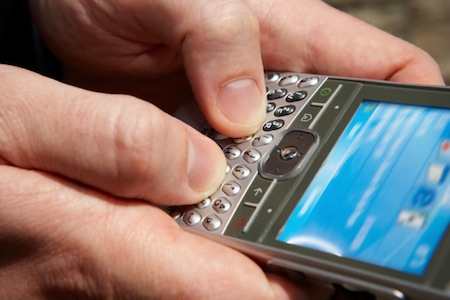She likes to text. He doesn’t. What do you do when your tech-communication style doesn’t match up?
“We text so much!” he said emphatically. “Are you kidding?” I responded, “We never text!” Looking back, maybe that was the moment I should have known it would never work out.
Although there are opinions galore—look no further than Sunday’s New York Times piece “The End of Courtship“—there is no empirical right or wrong amount to text or gchat, to Facebook or tweet, to email or to Instagram, to Skype or to Facetime. Old schoolers and the old-school nostalgists will wax poetic about the good old days when a boy had to pick up the phone (attached with a cord!) and call a girl. New schoolers and new-school evangelists will preach the value of connectivity and the magic of varied virtual communication. We can all prefer the communication forms we prefer, but isn’t the real question what to do when your expectations—dare we call them “textpectations”?—don’t line up?
*****
A friend of mine was recently dismissed by a potential date because she “went MIA” during the day and he didn’t feel sufficiently connected to bother pursuing her anymore. It stung, she said, but she was confident in her own communication strategy—of course she wasn’t going to text during the day, she’s at work! Her job is intense and often emotional, and there’s no time or energy to invest in flirty and casual text banter between 9am and 5pm. She’d rather focus at the office and then unwind later over a leisurely, face-to-face conversation. Apparently, this plan did not satisfy her suitor, and he gave up.
Everyone thinks they e-communicate at just the right frequency, and we can all point to friends and exes who fall on either edge of the spectrum and tsk-tsk at the too-much or not-enough we think we’re witnessing. I’m sure some friends look at me, on gchat all day, texting for no reason, sharing articles on Facebook, checking in on Foursquare, and think my desire to connect and to document all my connecting is over the top.
I know I look at my own Internet feeds and roll my eyes at the users who are even more engaged then I am. Do you need to check in at every exit on the highway? Do you need to retweet every comment by Aziz Ansari? Do you need to Instagram every movie ticket you purchase? We think we’re the normal ones, but like most things, it’s all relative. To my mom, checking email more than once a day is insane. When I sit next to my 21-year-old brother, I am astonished by the flurry of texts that buzz in and out of his phone at all hours of the day and night. Who could possibly have so much to say?
My ex-boyfriend, the one who thought we texted too much, was doing the best he could to keep up with me, while I was toning down my own textual enthusiasm to match his light responses. As we talked about it, it became clear that part of the distance was easily attributable to age—he was five years older than me, a gap just big enough to matter when it comes to the intersection of relationships and technology. Between when I was a teenager and he was a teenager, standards for communication had changed dramatically as the vehicles with which to communicate multiplied.
The day after our first date, he called me to check in and chat. I was with a friend when my phone rang, and I turned to her, unwilling to pick it up. Why would he be calling me? Is something wrong? Obviously, he must want to break it off, otherwise he would just send a checking-in text, right? Who calls people on the phone anymore? When I relayed this story to him later, he was dumbfounded. Of course you call, he said, isn’t that what you’re supposed to do if you have a good time? Our customs and expectations were entirely different, and we were both making assumptions based on what we assumed was “normal.”
*****
After all that, what I’m really here to say is, well, who am I to tell you what’s “normal” and what’s not? Who is the New York Times? What matters is what you do when you and your partner, or potential partner, have different expectations. The first step, in my experience, is to put all those assumptions and standards on the table and prod them a little bit. Where do they come from and how attached to them are you? Are they safety nets for your ego or genuine attempts to connect? Nice-to-haves or need-to-haves? How does daily virtual interaction affect the time you spend together in real-time? Does it make your relationship richer, nicely textured with quick notes and random quips, or does it make your relationship feel more shallow, with deeper connections blocked by surface distractions?
For better or for worse (you already know what you think about this, this essay is not designed to change your mind), technology is now a huge piece of how we find, maintain, and facilitate relationships both platonic and romantic. Some will say it distracts from what’s real, others will argue it helps us strengthen and broaden our connections. All that really matters, though, is finding someone, or someones, whose frequency you get and whose rhythm you appreciate.
Emily Heist Moss is a New Englander in love with Chicago, where she works in a tech start-up. She blogs every day about gender, media, politics and sex at Rosie Says, and has been published at Jezebel, The Frisky, The Huffington Post and The Good Men Project. Find her on Facebook and Twitter.
Related Links:

